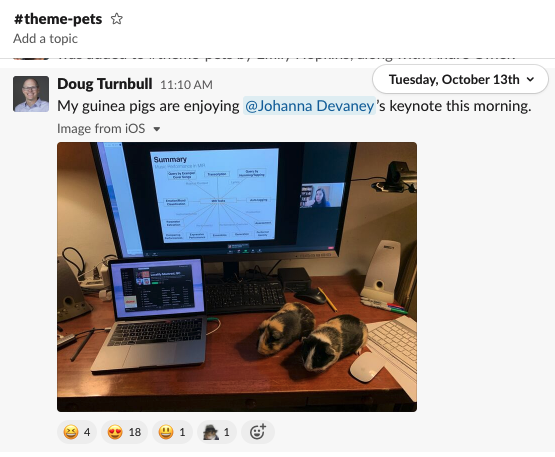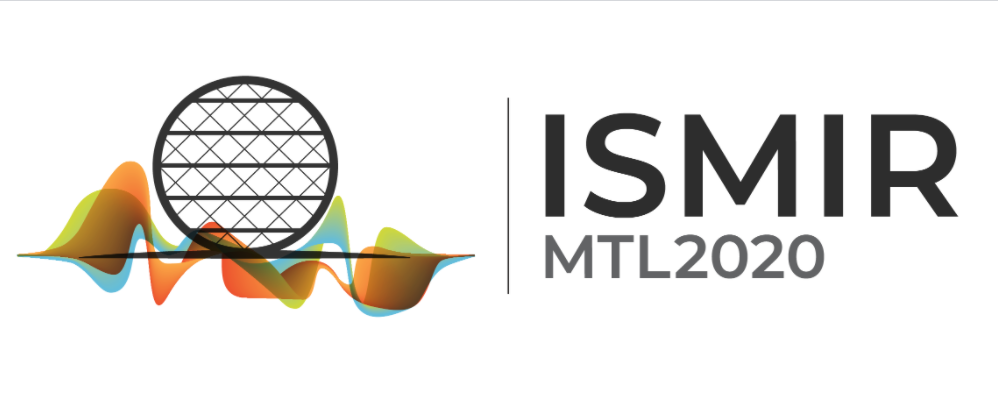Last week was an exercise in managing multiple mindspaces. There was my normal mid-semester teaching and academic work, my family life at home, and being a virtual participant at ISMIR ’20.
ISMIR is my favorite academic conference. I love the papers, the coffee breaks, the social events, and the late-night discussions. That is, I enjoy being sequestered with my academic people talking about my academic interests.
Having been a former program chair and a former ISMIR board member, I’ll admit to having helped twisted some arms to get the Montreal crew (Audrey Laplante and Ichiro Fujinaga) to agree to host the event a few years prior. I was really looking forward to the road trip from upstate New York across our border to the North. But then COVID-19 happened and like so many other things, there was a change of plans. C’est la vie.
Despite my initial worries about a week-long virtual conference experience, it turned out to be a highly productive and inspiring week. Between hundreds of Slack channels and hoping in-and-out of Zoom meetings for hours on end, I felt like I was able to learn about current music information research, reconnect with my friends, and talk to a few up-and-coming researchers. As a side note, I really appreciated having Slack channels dedicated to pets or food or music recommendations (actual music, not algorithms.) It made being “at the conference” fun and kinda addicting at times.

The academic program was exceptional and exceptionally-well presented with an easy-to-use website. Each paper had a special page with the abstract, paper pdf, a short 4-minute video, a poster, and links to the video sessions with the authors. I’m a visual learner so the videos were particularly helpful and I found myself watching a few multiple times. I also enjoyed sending direct messages to folks on Slack. One could argue that this was a bit easier than the physical analog of butting in at a coffee break or poster presentation.
At the end of the day, I much prefer the old school physical conference experience. However, as the organizers pointed out, the attendance was almost double (400 vs. 800) and the carbon footprint usually due to the worldwide travel was next to none. While I am deeply fearful of a “Ready Player One”-style dystopia in which everyone lives behind a screen, I am glad that we were able to still make the most out of our beloved conference during COVID quarantine.
All the best,
Doug
Our Presented Works
Exploring Acoustic Similarity for Novel Music Recommendation
Derek S Cheng, Thorsten Joachims, Douglas Turnbull
We explored a specific situation in which content-based music analysis might be useful for introducing a novel (local) artist to a user based on similarity to song that a user already likes.
Can We Determine Artist Origin from Past Live Events?
Michael G Zhou, Douglas Turnbull, Thorsten Joachims
We wanted to see if we could use historical live music event locations to determine where an artist originates from.
Other Works that Resonated
Practical Evaluation of Repeated Recommendations in Personalized Music Discovery
Brian Manolovitz, Mitsunori Ogihara
An interesting user study that shows how repeated exposure to new music requires multiple listens before a user can make a judgment about a song. There a number of good papers about the mere-exposure effect as it relates to familiarity and preference but this paper looks at it in the context of a more real-world experience on a modern music streaming platform.
User Insights on Diversity in Music Recommendation Lists
Kyle Robinson, Dan Brown, Markus Schedl
Another user study exploring how diversity should play into music recommendation. The users are given a “diversity knob” to re-rank songs so that the users can control diversity. They find that there is a difference between inner and outer diversity within their existing preferences.
More to follow…
